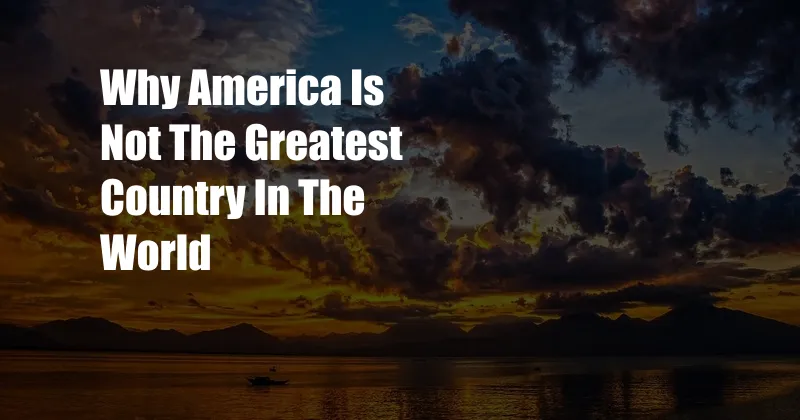
Why America is Not the Greatest Country in the World
In the tapestry of the world’s nations, each thread holds its unique charm and value. Yet, the rhetoric of “America’s greatness” has been woven so intricately into our national narrative that it often obscures a more nuanced understanding of our place in the global tapestry. While America has made significant contributions to humanity, it is flawed, as are all nations. A balanced perspective requires an acknowledgment of our shortcomings alongside our strengths.
This article will explore the reasons why America may not be the greatest country in the world, not to detract from its achievements but to foster a more realistic and inclusive dialogue. By examining our weaknesses and areas of improvement, we can strive to become a truly just, equitable, and compassionate society.
Income Inequality: A Glaring Disparity
Marked income inequality is a persistent issue in America, with a widening gap between the wealthiest and the poorest. This disparity has far-reaching implications for social mobility, economic growth, and overall well-being. Studies have shown that high levels of inequality can lead to social unrest, reduced economic growth, and a decline in overall happiness.
America’s income gap is among the highest in developed countries. The top 1% of earners capture a disproportionate share of the national income, while the bottom 50% struggle to make ends meet. This inequality is exacerbated by a lack of access to quality education, healthcare, and housing for many Americans.
Mass Incarceration: A Systemic Injustice
America has the highest incarceration rate in the world, with over two million people behind bars. This staggering number is disproportionately composed of people of color, who are more likely to be arrested, convicted, and sentenced to longer prison terms for similar offenses compared to white Americans.
Mass incarceration has a devastating impact on communities, particularly those with high poverty rates. It disrupts families, erodes social capital, and perpetuates a cycle of crime and recidivism. Additionally, the high costs of incarceration divert funds from essential social programs, further exacerbating systemic inequities.
Healthcare: A Fragmented System with Gaps
Access to quality healthcare is a fundamental human right, yet America’s healthcare system remains fragmented and expensive. Despite spending more per capita on healthcare than any other developed country, America has lower life expectancy and higher infant mortality rates compared to its peers.
The Affordable Care Act (ACA) has made significant strides in expanding health insurance coverage, but millions of Americans remain uninsured or underinsured. The high cost of prescription drugs, medical procedures, and private health insurance premiums pose a major financial burden on many families.
Gun Violence: A Tragic Epidemic
Gun violence is a uniquely American problem that has reached epidemic proportions. Mass shootings, school shootings, and domestic violence-related shootings are far more common in America than in other developed countries.
The proliferation of firearms in America is a major contributing factor to gun violence. Lack of comprehensive gun control laws, including universal background checks, assault weapon bans, and high-capacity magazine restrictions, exacerbates the issue. Gun violence has a devastating impact on individuals, families, and communities, causing irreparable trauma and loss.
Lack of Paid Family Leave: A Societal Shortcoming
America is one of the few developed countries that does not offer paid family leave to its workers. This absence of government-supported leave for new parents or caregivers creates significant challenges for families and the economy.
Paid family leave allows parents to bond with their newborn children, care for sick family members, or attend to other family emergencies without facing financial hardship. Research shows that paid family leave improves infant and child health outcomes, strengthens family bonds, and supports women’s economic empowerment.
Expert Advice and Tips
Addressing these issues requires concerted effort from all sectors of society. Here are some tips and expert insights:
Advocate for Policies that Promote Income Equality: Support policies that raise the minimum wage, expand access to affordable housing, and invest in education and job training programs for low-income Americans.
Support Criminal Justice Reform: Promote legislation that reduces mandatory minimum sentences, decriminalizes non-violent drug offenses, and expands access to rehabilitation programs for incarcerated individuals.
Universal Healthcare: Advocate for a single-payer healthcare system or other comprehensive reforms that guarantee access to quality, affordable healthcare for all Americans.
Gun Control Measures: Support comprehensive gun control measures that include universal background checks, assault weapon bans, and high-capacity magazine restrictions.
Paid Family Leave: Advocate for legislation that establishes a national paid family leave program that provides workers with paid time off for family and medical reasons.
FAQ
Q: Why is America perceived as the greatest country in the world?
A: America’s self-perception as the greatest country is rooted in factors such as its economic power, military strength, and historical dominance. However, this perception is often subjective and does not reflect the lived experiences of all Americans.
Q: Does America have the best economy?
A: America has a large and prosperous economy, but it is not necessarily the best. Other countries, such as Norway, Finland, and Denmark, rank higher in terms of economic equality, social welfare, and overall well-being.
Q: Is America the safest country?
A: America’s high crime rate, particularly gun violence, makes it far less safe than many other developed countries. Nations such as Canada, Australia, and New Zealand have significantly lower crime rates and higher levels of public safety.
Conclusion
Embracing a nuanced understanding of America’s strengths and weaknesses is essential for creating a more just, equitable, and compassionate society. By acknowledging our shortcomings and working collectively to address them, we can strive towards a truly great America for all.
Are you interested in further exploring these issues and finding ways to make a positive impact? Engage with the resources provided in this article and join the ongoing dialogue. Together, we can build a better future for our nation and the world.